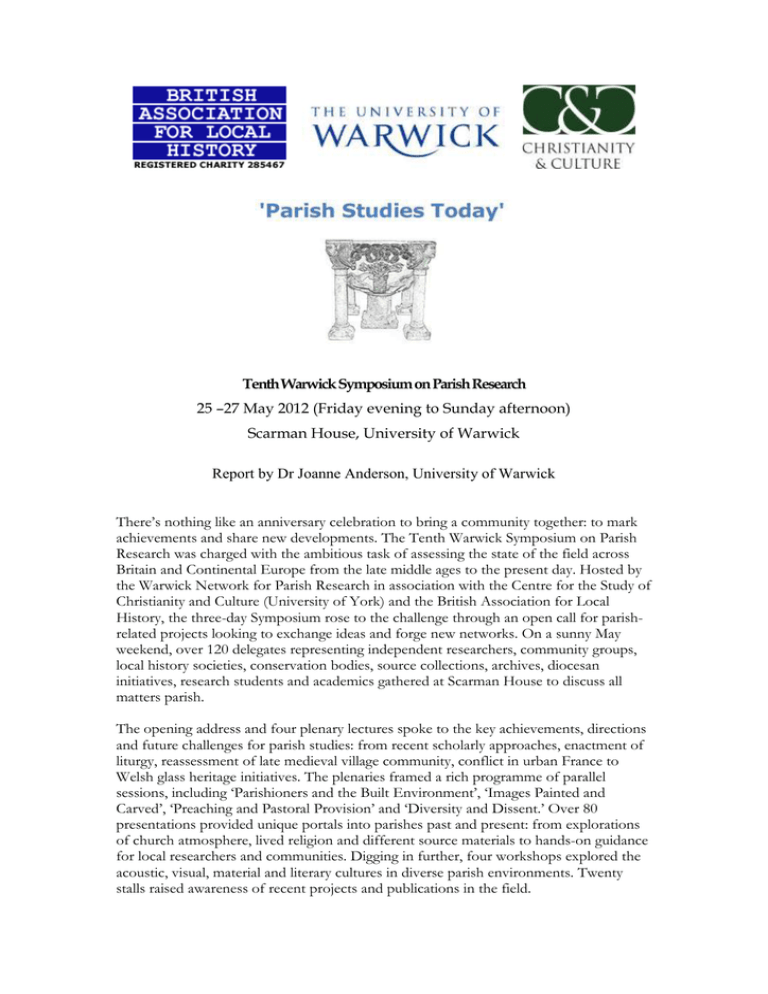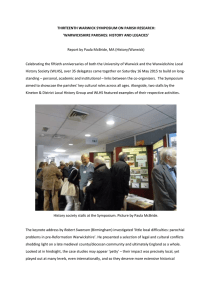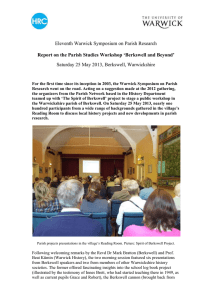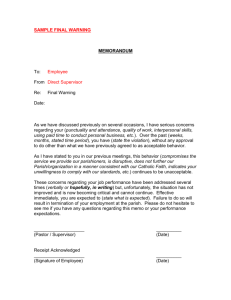Tenth Warwick Symposium on Parish Research Scarman House, University of Warwick
advertisement

Tenth Warwick Symposium on Parish Research 25 –27 May 2012 (Friday evening to Sunday afternoon) Scarman House, University of Warwick Report by Dr Joanne Anderson, University of Warwick There’s nothing like an anniversary celebration to bring a community together: to mark achievements and share new developments. The Tenth Warwick Symposium on Parish Research was charged with the ambitious task of assessing the state of the field across Britain and Continental Europe from the late middle ages to the present day. Hosted by the Warwick Network for Parish Research in association with the Centre for the Study of Christianity and Culture (University of York) and the British Association for Local History, the three-day Symposium rose to the challenge through an open call for parishrelated projects looking to exchange ideas and forge new networks. On a sunny May weekend, over 120 delegates representing independent researchers, community groups, local history societies, conservation bodies, source collections, archives, diocesan initiatives, research students and academics gathered at Scarman House to discuss all matters parish. The opening address and four plenary lectures spoke to the key achievements, directions and future challenges for parish studies: from recent scholarly approaches, enactment of liturgy, reassessment of late medieval village community, conflict in urban France to Welsh glass heritage initiatives. The plenaries framed a rich programme of parallel sessions, including ‘Parishioners and the Built Environment’, ‘Images Painted and Carved’, ‘Preaching and Pastoral Provision’ and ‘Diversity and Dissent.’ Over 80 presentations provided unique portals into parishes past and present: from explorations of church atmosphere, lived religion and different source materials to hands-on guidance for local researchers and communities. Digging in further, four workshops explored the acoustic, visual, material and literary cultures in diverse parish environments. Twenty stalls raised awareness of recent projects and publications in the field. More informally, our postgraduate students and early career academics led the way for new themes and approaches in the evening round table, ‘Parish Studies Tomorrow.’ They engaged delegates in a lively discussion that was both inspiring and provocative, especially concerning the label of ‘parish scholar’. A concluding discussion on Sunday yielded ideas for future initiatives, like on-site day schools with input from host parishes, regional conferences and specific collaborations. We are encouraged by such positive feedback. Indeed, detailed pre and post-Symposium questionnaires indicate that the anniversary initiative has increased awareness of the Network and its key aims (http://go.warwick.ac.uk/parishnetwork). The new ‘MyParish web platform, due to go live this summer, will further encourage this momentum by offering individuals and groups with parish interests interactive space for promotion, guidance and networking. Edited films and podcasts of the Symposium will also be available from this website, reflecting our commitment to connecting communities, propagating resources and sharing expertise. The Symposium was over a year in the planning and the Warwick Network for Parish Research gratefully acknowledges the efforts of co-organizers Joanne Anderson, Beat Kümin and Don White; the support of Warwick’s Humanities Research Centre, Humanities Research Fund and ‘Digital Age’ Global Priorities Programme; the key contributions by conference administrator Susan Dibben, e-learning advisor Robert O’Toole, symposium assistants Agata Gomolka, Matthew Jackson and Paula McBride and film director Matthew Fuller. Finally, and most importantly, thanks are due to all the chairs, presenters and delegates who travelled from near and afar to underline the vibrancy of parish studies as an interdisciplinary field of research. A Parish Network is nothing without its people and we are in good shape. Humanities Research Fund digital change Realising the digital future




